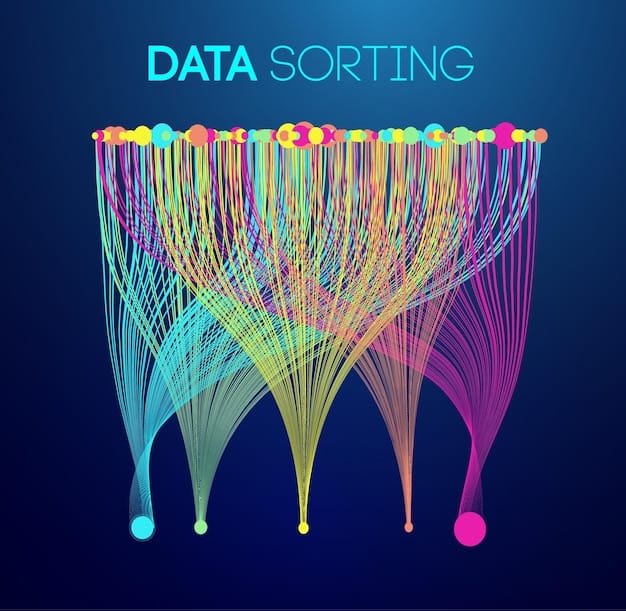New Federal Data Privacy Regulations 2025: Impact on Online Security

The New Federal Regulations on Data Privacy: How the Latest Changes in 2025 Impact Your Online Security are poised to significantly reshape how personal information is collected, stored, and utilized, dramatically enhancing consumer protections and requiring businesses to adopt more transparent and secure data handling practices across the United States.
The digital landscape is in constant flux, with new technologies emerging daily and our personal data becoming an increasingly valuable commodity. As we approach 2025, a significant shift is on the horizon: the implementation of new federal regulations on data privacy. These impending changes promise to redefine the rules of engagement for businesses and individuals alike, fundamentally altering how our personal information is managed online. Understanding the implications of these regulations is not just for corporations; it is crucial for every internet user concerned about their digital footprint and online safety. The New Federal Regulations on Data Privacy: How the Latest Changes in 2025 Impact Your Online Security will empower consumers and demand greater accountability from entities handling sensitive data.
The evolving landscape of data privacy laws
The concept of data privacy, once an abstract legal notion, has rapidly transformed into a critical public concern. Historically, the United States has adopted a sectoral approach to data protection, meaning different laws apply to different industries or types of data. This patchwork of regulations, ranging from HIPAA for healthcare information to COPPA for children’s online privacy, has often led to inconsistencies and gaps in protection. However, the sheer volume of data breaches and the increasing sophistication of data exploitation have highlighted the urgent need for a more unified and comprehensive framework.
This growing awareness, fueled by high-profile privacy scandals and global regulatory movements like Europe’s General Data Protection Regulation (GDPR), has put immense pressure on lawmakers to act decisively. The digital revolution, while bringing unprecedented connectivity, has also created new vulnerabilities for our personal information. Every click, every purchase, and every social media interaction generates data that can be used, or misused, in ways many consumers do not fully comprehend. The absence of a strong, overarching federal standard has left many Americans feeling exposed and uncertain about their rights online. This intricate web of existing laws, coupled with an increasingly complex digital reality, underscores the necessity of a harmonized approach to data privacy.
From sectoral to comprehensive: a federal imperative
The move towards a federal standard is a response to the inherent limitations of state-level laws. While states like California have led the charge with robust privacy legislation such as the CCPA and CPRA, relying solely on state-specific regulations creates a complex compliance nightmare for businesses operating across state lines and offers inconsistent protection for citizens nationwide. A federal law aims to streamline compliance, ensuring a single set of rules for all while providing a baseline of protection for every American. This shift marks a recognition that data privacy is not just a state-specific issue but a matter of national security and economic stability.
- Regulatory Harmony: A unified federal law reduces the burden of navigating disparate state regulations for businesses.
- Universal Protection: Ensures that all U.S. citizens receive the same fundamental data privacy rights and protections, regardless of their location.
- Economic Stability: Fosters a more predictable environment for digital commerce and innovation by setting clear boundaries for data handling.
Lessons learned from global standards
The development of new federal regulations in the U.S. has undoubtedly been influenced by international precedents. The GDPR is often cited as a benchmark for robust data protection, empowering individuals with significant control over their personal data. Similarly, other nations have implemented their own comprehensive privacy frameworks. These global standards have demonstrated both the effectiveness of strong privacy laws in protecting consumers and the challenges businesses face in adapting to them. The upcoming U.S. federal regulations will likely draw upon these lessons, aiming to strike a balance between individual rights and economic realities.
Key components of the 2025 federal data privacy regulations
The new federal regulations arriving in 2025 are designed to be a landmark effort, consolidating and strengthening America’s approach to data privacy. At their core, these regulations introduce a series of fundamental rights for consumers and delineate clear responsibilities for businesses that collect, process, and share personal data. The goal is to create a more transparent and accountable digital ecosystem where individuals have greater control over their information. This comprehensive framework builds upon previous discussions and regulatory drafts, incorporating feedback from various stakeholders including consumer advocacy groups, technology companies, and legal experts.
One of the cornerstones of the new regulations is the emphasis on informed consent. No longer will pre-checked boxes or obscure terms and conditions suffice. Businesses will be required to obtain explicit, unambiguous consent from individuals before collecting and processing their data, particularly for sensitive information. This means clearer language, more accessible privacy policies, and straightforward options for opting in or out of data collection. This shift aims to empower users to make genuine choices about their data, moving away from a system where consent is often implicitly given or buried within lengthy legal documents. The clarity and prominence of these consent mechanisms are expected to be rigorously enforced.

Enhanced consumer rights and data control
The regulations will significantly expand consumer rights concerning their personal data. One of the most anticipated rights is the “right to know,” allowing individuals to request information about what data is being collected about them, why it’s being collected, and with whom it’s being shared. This right ensures transparency, enabling consumers to understand their digital footprint. Another critical component is the “right to access and portability,” which grants individuals the ability to obtain a copy of their data in a readily usable format and to transfer it to another service provider. This fosters competition and gives consumers more flexibility.
- Right to Deletion: Individuals can demand that their personal data be erased under certain circumstances, offering a powerful tool for removing sensitive information.
- Right to Correction: Consumers can ask for inaccuracies in their data to be corrected, ensuring the integrity and precision of their digital profiles.
- Right to Opt-Out of Sale/Sharing: A fundamental right to prevent businesses from selling or sharing their personal data with third parties, often central to targeted advertising.
Stricter obligations for businesses
For businesses, the new regulations will usher in a stricter era of data governance. Companies will be mandated to implement robust data security measures, conduct regular data protection impact assessments, and appoint data protection officers for certain organizations. The principle of “data minimization” will also be central, requiring businesses to collect only the data absolutely necessary for a specified purpose and to retain it only for as long as needed. These obligations underscore a proactive rather than reactive approach to data protection, aiming to prevent breaches and misuse at the source.
Furthermore, accountability will be a key theme. Businesses found in violation of these regulations will face substantial penalties, including hefty fines and potential legal action. The enforcement mechanisms are expected to be comprehensive, involving federal agencies with the authority to investigate and prosecute non-compliance. This financial and reputational risk is intended to incentivize companies to prioritize data privacy and invest in the necessary infrastructure and processes to meet the new standards. The regulations also anticipate specific requirements for data breach notifications, ensuring affected individuals are promptly informed and can take necessary precautions. These stringent measures are designed to embed data privacy into the core operational ethos of every organization.
Impact on online security: A new era of protection
The introduction of these new federal data privacy regulations in 2025 is poised to usher in a transformative era for online security. By establishing clearer guidelines and stricter enforcement mechanisms, the regulations aim to elevate the baseline of protection for personal data across the digital spectrum. This isn’t merely about compliance; it’s about fundamentally reshaping how organizations perceive and manage the sensitive information entrusted to them. The regulations will compel businesses to integrate security earlier into their operations, making it a foundational element rather than an afterthought.
One of the most immediate effects will be on data handling practices. Businesses will be required to implement enhanced security protocols, from encryption for data at rest and in transit to multi-factor authentication for access. This proactive approach aims to minimize vulnerabilities that could lead to data breaches. Furthermore, regular security audits and vulnerability assessments will become standard practice, ensuring that systems are consistently tested and improved. The penalties for non-compliance are severe enough to make ignoring these requirements a financially prohibitive risk, driving widespread adoption of best-in-class security measures. This creates a ripple effect, improving the overall security posture of the internet at large.
Strengthening data breach prevention and response
A significant focus of the 2025 regulations will be on strengthening data breach prevention and response mechanisms. Companies will be mandated to develop and maintain comprehensive data breach response plans, outlining clear steps for identification, containment, eradication, recovery, and post-breach analysis. This includes swift notification obligations, ensuring that individuals whose data has been compromised are informed in a timely manner, allowing them to take immediate protective actions. The regulations aim to standardize the breach notification process, eliminating inconsistencies that currently exist.
- Mandatory Security Assessments: Regular and thorough evaluations of data systems to identify and mitigate potential vulnerabilities.
- Employee Training: Compulsory training programs for staff on data privacy best practices, reducing human error as a vector for breaches.
- Incident Reporting Protocols: Clearly defined procedures for reporting security incidents, both internally and to relevant regulatory bodies, facilitating quicker action.
Promoting privacy-by-design and privacy-by-default
The regulations are expected to heavily promote the principles of “privacy-by-design” and “privacy-by-default.” Privacy-by-design means incorporating data protection considerations into the design and architecture of systems and business practices from the very outset, rather than layering them on afterwards. Privacy-by-default implies that, unless a user explicitly provides consent for broader data use, the strictest privacy settings should be applied automatically. These principles shift the burden of privacy protection from the individual consumer to the organizations handling the data, ensuring that privacy is the default rather than an optional extra.
The shift toward these principles necessitates a fundamental reevaluation of product development and service delivery. Engineers, designers, and marketing teams will need to collaborate closely with legal and privacy experts to ensure new offerings comply with the regulations from conception. This proactive approach has the potential not only to enhance security but also to build greater trust with consumers, who will know that their privacy is considered a core value. For individuals, this means a more secure and respectful online experience, diminishing the need for constant vigilance over their privacy settings.
Challenges and opportunities for businesses
The advent of the 2025 federal data privacy regulations presents a dual-edged sword for businesses across the United States. While the stricter mandates are designed to enhance consumer trust and standardize compliance, they simultaneously introduce significant operational and financial challenges. Companies will need to fundamentally re-evaluate their data collection, storage, processing, and sharing practices, potentially requiring substantial investments in new technologies, processes, and personnel. The landscape for innovation and competitive advantage will also be altered, favoring those who can adapt quickly and genuinely prioritize privacy.
One of the primary challenges will be achieving full compliance across all business functions. This encompasses updating legal agreements and privacy policies, reconfiguring IT infrastructure to meet enhanced security standards, and training employees on new data handling protocols. For smaller businesses, especially those without dedicated legal or IT departments, the cost and complexity of compliance could be particularly daunting. There’s also the hurdle of integrating existing legacy systems with new privacy-by-design requirements, which can be a time-consuming and expensive undertaking. Moreover, companies will need to ensure that their third-party vendors and partners also adhere to the same stringent standards, as data sharing agreements will come under increased scrutiny.
Investing in compliance and ethical data practices
For forward-thinking businesses, these regulations offer a unique opportunity to differentiate themselves in the marketplace. Companies that embrace the spirit of the law, moving beyond mere compliance to genuinely embed ethical data practices into their core operations, can build stronger relationships with their customers. Investing in robust privacy programs, transparent data handling, and demonstrably secure systems can become a significant competitive advantage. Consumers are increasingly wary of how their data is used, and businesses that prioritize privacy will likely gain a greater share of trust and loyalty.
- Reputational Boost: Demonstrating commitment to data privacy can significantly enhance a company’s brand image and customer loyalty.
- Innovation in Privacy Technology: The demand for privacy-enhancing technologies (PETs) will spur innovation, creating new market opportunities.
- Operational Efficiencies: Streamlining data handling processes for compliance can also lead to better data governance and more efficient operations overall.
Navigating the enforcement landscape
The new regulations will also bring a more robust enforcement landscape. Businesses must be prepared for increased scrutiny from federal regulators and potentially private rights of action. This means not only adhering to the letter of the law but also being able to demonstrate that adherence through comprehensive records, impact assessments, and clear internal policies. The potential for significant fines and reputational damage for non-compliance necessitates a proactive and meticulous approach to data governance. Understanding the nuances of federal enforcement and staying abreast of interpretive guidance will be crucial for sustained success.
Furthermore, the legal framework surrounding data privacy is dynamic. Businesses will need to establish continuous monitoring and adaptation strategies to ensure ongoing compliance as new clarifications or amendments to the regulations emerge. This requires a strong legal and compliance team, or access to expert counsel, to interpret new guidance and adjust internal policies accordingly. Ultimately, these regulations call for a cultural shift within organizations, where data privacy is viewed not as a regulatory burden but as an essential component of responsible business conduct and a cornerstone of customer trust.
Consumer empowerment: What the regulations mean for you
The upcoming federal data privacy regulations in 2025 represent a significant victory for the average internet user, fundamentally shifting the balance of power from data collectors back to individuals. For too long, consumers have navigated a digital world where their personal information was often collected, analyzed, and shared without their full understanding or explicit consent. These new rules are designed to rectify that imbalance, providing a robust framework that empowers individuals with greater control and transparency over their digital lives. This new era of consumer empowerment means a more secure and respectful online experience.
At the heart of this empowerment is the principle of informed consent. Gone are the days when obscure privacy policies buried in lengthy terms and conditions would suffice. The regulations demand clear, concise language and explicit opt-in mechanisms for data collection and processing, particularly for sensitive information. This means you will have a much clearer understanding of what data is being gathered, why, and how it will be used, before you agree to anything. This transparency allows you to make genuine, conscious decisions about your personal information, rather than passively accepting broad permissions. It is a monumental step towards digital literacy and personal autonomy.

Taking back control of your data
The regulations introduce and reinforce several key rights that directly translate into greater individual control. The “right to know” gives you the power to inquire about the specific data a company holds about you, its sources, and its recipients. The “right to access and portability” means you can request a copy of your data in an easily usable format and transfer it to another service, breaking down data silos and fostering competition. Perhaps most impactful are the “right to deletion” and the “right to opt-out of sale or sharing,” providing mechanisms to erase your data or prevent its commercial distribution.
- Active Consent: You will need to explicitly agree to data collection and processing, especially for new services or sensitive data types.
- Simplified Opt-Out: Companies will be required to make it easier for you to opt out of data sharing and targeted advertising.
- Increased Transparency: Companies must provide clearer privacy policies and explain data practices in an understandable way.
Enhanced online safety and reduced exploitation
Beyond just control, the regulations are expected to significantly enhance your overall online security and reduce the potential for exploitative data practices. By mandating stronger security measures for businesses, the risk of your data falling into the wrong hands through breaches will be considerably reduced. The focus on data minimization means companies should only collect what’s necessary, lessening the pool of data that could be compromised. This not only protects against financial fraud and identity theft but also limits the scope of pervasive tracking and profiling that can influence online experiences.
Furthermore, the stricter penalties for non-compliance will incentivize businesses to respect your privacy, leading to a more ethical digital environment. You will be better protected from unfair discriminatory practices based on your data and from aggressive, unwanted marketing. The shift towards “privacy-by-design” ensures that privacy is built into the very products and services you use, rather than being an optional add-on. This collective effect means a more trustworthy and safer online space, empowering you to navigate the internet with greater confidence and peace of mind.
Preparing for the 2025 regulatory shift
As the implementation date for the new federal data privacy regulations in 2025 draws closer, both individuals and businesses must proactively prepare for this significant shift. For consumers, preparation means becoming more informed and assertive about their digital rights. For businesses, it involves a comprehensive overhaul of data handling practices and a commitment to ongoing compliance. This proactive readiness will be crucial for navigating the evolving digital landscape successfully and avoiding potential pitfalls.
For individuals, the first step is to educate yourself about your expanded rights under the new regulations. Understanding what information companies can collect, your right to access, correct, or delete that data, and how to opt out of its sale or sharing is paramount. Start by reviewing the privacy policies of the services you use most frequently, even if they currently comply with existing state laws. As the federal regulations take effect, companies will update these policies, and it’s essential to read them carefully to understand any changes to your data rights and obligations.
For individuals: Mastering your digital footprint
Empowering yourself requires taking a more active role in managing your online presence. Regularly review privacy settings on social media platforms, search engines, and e-commerce sites. Be judicious about the information you share online and consider using privacy-enhancing tools like VPNs or privacy-focused browsers. The new regulations provide the legal backing, but personal vigilance remains a key component of online security.
- Review Privacy Policies: Understand how companies collect and use your data.
- Exercise Your Rights: Don’t hesitate to request access to your data or to opt out of data sharing when the regulations take effect.
- Strengthen Security Practices: Use strong, unique passwords and enable two-factor authentication wherever possible.
For businesses: A strategic roadmap to compliance
Businesses face a more complex, multi-faceted preparation process. This involves conducting a thorough data audit to map all data flows within the organization, identifying what data is collected, where it’s stored, who has access, and how it’s used. Based on this audit, companies must then update their data privacy policies and procedures to align with the new federal standards. This includes revising consent mechanisms, establishing clear processes for fulfilling consumer data requests, and implementing robust data security measures.
A critical aspect of business preparation is employee training. Every individual within an organization who handles personal data must be educated on the new regulations and the company’s updated policies. This includes understanding the importance of data minimization, secure data handling, and proper incident response protocols. Furthermore, companies should engage legal and compliance experts early in the process to ensure all changes meet regulatory requirements and to prepare for potential enforcement actions. The deadline for 2025 is not far off, making proactive and strategic planning an immediate necessity for all entities operating within the online space.
The long-term outlook: A more secure and private internet
The comprehensive federal data privacy regulations set to fully impact the United States in 2025 are not merely a compliance hurdle but a foundational shift towards a more secure and private internet. While the immediate focus might be on the challenges of implementation and adaptation, the long-term outlook promises a digital ecosystem characterized by greater trust, enhanced individual control, and a more ethical approach to data handling. This transformation has the potential to fundamentally redefine the relationship between users and the digital services they engage with daily.
In the long run, these regulations are expected to foster a competitive environment where companies that prioritize privacy and security are rewarded. Consumers, now armed with more robust rights and clearer understanding of data practices, will likely gravitate towards services that demonstrate genuine respect for their personal information. This “privacy as a competitive advantage” dynamic will encourage innovation in privacy-enhancing technologies and business models, driving a race to the top for data protection standards rather than a race to the bottom for data exploitation.
Fostering innovation with privacy at its core
Far from stifling innovation, strong data privacy regulations often compel companies to innovate in more responsible and ethical ways. Instead of relying on broad data collection and intrusive profiling, businesses will be encouraged to develop services that deliver value while minimizing data footprint. This could lead to the emergence of privacy-preserving machine learning techniques, anonymous data analytics, and new forms of personalized experiences that do not compromise individual privacy. The creativity unleashed by these constraints can ultimately lead to a healthier and more sustainable digital economy.
- Trust Dividend: Increased consumer trust can lead to greater engagement and investment in the digital economy.
- Reduced Litigation Risk: Proactive compliance minimizes legal battles and associated costs in the long run.
- Global Standard Alignment: U.S. regulations will align more closely with international data protection standards, facilitating global commerce and data flow.
A continually evolving landscape
It is important to recognize that the digital privacy landscape is not static. The 2025 regulations represent a significant milestone, but they are unlikely to be the final word on data protection. As technology continues to evolve at a rapid pace, new challenges and opportunities for privacy will inevitably emerge. Therefore, the long-term outlook also anticipates a need for ongoing regulatory review and adaptation, ensuring that laws remain relevant and effective in safeguarding personal data. This continuous evolution will require sustained dialogue between policymakers, industry, and privacy advocates to anticipate future needs and maintain a robust framework for online security and privacy for decades to come.
Ultimately, the goal of these federal regulations is to create a digital world where individuals feel safe, respected, and empowered. By establishing clear rules, strong enforcement, and promoting ethical data practices, the 2025 changes lay the groundwork for an internet that serves humanity, rather than exploiting it. The journey will involve challenges, but the destination—a more secure, private, and trustworthy online experience for all—is well worth the effort.
| Key Aspect | Brief Description |
|---|---|
| ⚖️ Unified Federal Standard | Replaces fragmented state laws with a single, comprehensive regulation for data privacy across the US. |
| 🔐 Enhanced Consumer Rights | Grants individuals rights to know, access, correct, delete, and opt-out of data sale/sharing. |
| 🏛️ Stricter Business Obligations | Mandates robust security, data minimization, privacy-by-design, and severe penalties for non-compliance. |
| 🛡️ Improved Online Security | Aims to reduce data breaches and exploitation through mandatory security protocols and ethical data handling. |
Frequently Asked Questions about 2025 Data Privacy Regulations
The primary goal is to establish a unified and comprehensive framework for data privacy across the United States. It aims to empower consumers with greater control over their personal data and to hold businesses more accountable for how they collect, process, and protect that information, thereby enhancing online security for everyone.
You can expect enhanced security measures from companies handling your data, leading to a reduced risk of breaches. You’ll also have greater control over what data is collected and shared, fostering a more secure and transparent digital experience, with mechanisms to delete or correct your personal information easily.
Consumers will gain significant rights, including the right to know what data is collected, the right to access and port their data, the right to correct inaccuracies, the right to delete their data, and the crucial right to opt-out of the sale or sharing of their personal information with third parties.
Businesses must implement robust data security measures, obtain explicit consent for data collection, adopt privacy-by-design principles, conduct data protection impact assessments, and establish clear breach response plans. Non-compliance will result in substantial financial penalties and reputational damage.
While the goal is to create a unified federal standard, the exact relationship between the federal regulations and existing state laws is complex. The federal law aims to provide a baseline of protection, but some state laws may offer additional protections. It’s expected to streamline fragmented regulations but might not entirely supersede all state-specific provisions.
Conclusion
The impending New Federal Regulations on Data Privacy: How the Latest Changes in 2025 Impact Your Online Security represent a crucial inflection point in the ongoing quest for digital autonomy and protection. By establishing a comprehensive and unified framework, these regulations are set to fundamentally transform how personal information is handled across the United States. For individuals, this means a significant enhancement of rights, fostering greater transparency and control over their digital footprint. For businesses, while presenting clear compliance challenges, it also offers a vital opportunity to build consumer trust through ethical data practices and robust security measures. This shift towards a more secure and private internet holds the promise of a digital future where user data is respected, protected, and managed responsibly, paving the way for a more trustworthy and resilient online ecosystem for all.





